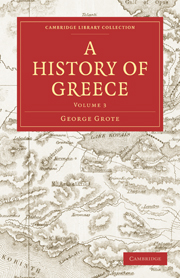Book contents
- Frontmatter
- Contents
- PART.II CONTINUATION OF HISTORICAL GREECE
- CHAPTER IX Corinth, Sikyôn, and Megara.—Age of the Grecian Despots
- CHAPTER X Ionic portion of Hellas.—Athens before Solon
- CHAPTER XI Solonian Laws and Constitution
- CHAPTER XII Eubœa.—Cyclades
- CHAPTER XIII Asiatic Ionians
- CHAPTER XIV Æolic Greeks in Asia
- CHAPTER XV Asiatic Dorians
- CHAPTER XVI Natives of Asia Minor with whom the Greeks became connected
- CHAPTER XVII Lydians.—Medes.—Cimmerians.—Scythians
- CHAPTER XVIII Phenieians
- CHAPTER XIX Assyrians.—Babylon
- CHAPTER XX Egyptians
- CHAPTER XXI Decline of the Phenicians.—Growth of Carthage
- CHAPTER XXII Western Colonies of Greece—in Epirus, Italy, Sicily, and Gaul
- CHAPTER XXIII Grecian Colonies in and near Epirus
- CHAPTER XXIV Akarnanians.—Epirots
- Plate section
CHAPTER XVII - Lydians.—Medes.—Cimmerians.—Scythians
Published online by Cambridge University Press: 05 October 2010
- Frontmatter
- Contents
- PART.II CONTINUATION OF HISTORICAL GREECE
- CHAPTER IX Corinth, Sikyôn, and Megara.—Age of the Grecian Despots
- CHAPTER X Ionic portion of Hellas.—Athens before Solon
- CHAPTER XI Solonian Laws and Constitution
- CHAPTER XII Eubœa.—Cyclades
- CHAPTER XIII Asiatic Ionians
- CHAPTER XIV Æolic Greeks in Asia
- CHAPTER XV Asiatic Dorians
- CHAPTER XVI Natives of Asia Minor with whom the Greeks became connected
- CHAPTER XVII Lydians.—Medes.—Cimmerians.—Scythians
- CHAPTER XVIII Phenieians
- CHAPTER XIX Assyrians.—Babylon
- CHAPTER XX Egyptians
- CHAPTER XXI Decline of the Phenicians.—Growth of Carthage
- CHAPTER XXII Western Colonies of Greece—in Epirus, Italy, Sicily, and Gaul
- CHAPTER XXIII Grecian Colonies in and near Epirus
- CHAPTER XXIV Akarnanians.—Epirots
- Plate section
Summary
The early relations between the Lydians and the Asiatic Greeks, anterior to the reign of Gygês, are not better known to us than those of the Phrygians. Their native music, like the Phrygian, became partly incorporated with the Greek, and the two seem to have been very analogous, both in instruments and in character, though the Lydian mode was considered by the ancients as more effeminate and enervating. The flute was used alike by Phrygians and Lydians, and passed from both of them to the Greeks; but the magadis or pectis (a harp with sometimes as many as twenty strings, sounded two together in octave) is said to have been borrowed by the Lesbian Terpander from the Lydian banquets1 The flute-players who acquired esteem among the early Asiatic Greeks were often Phrygian or Lydian slaves, and even the poet Alkman, who gained for himself permanent renown among the Greek lyric poets, though not a slave born at Sardis, as is sometimes said, was probably of Lydian extraction.
It has been mentioned that Homer knows nothing of Lydia or Lydians : he names Mæonians in juxtaposition with Karians, and we are told by Herodotus that the people once called Mæonian received the new appellation of Lydian from Lydus son of Atys. Sardis, whose almost inexpugnahle citadel was situated on a precipitous rock on the northern side of the ridge of Tmôlus, overhanging the plain of the river Hermus, was the capital of the Lydian kings: it is not named by Homer, though he mentions both Tmôlus and the neighbouring Gygæan lake: the fortification of it was ascribed to an old Lydian king named Mêlês, and strange legends were told concerning it.
- Type
- Chapter
- Information
- A History of Greece , pp. 294 - 351Publisher: Cambridge University PressPrint publication year: 2010

